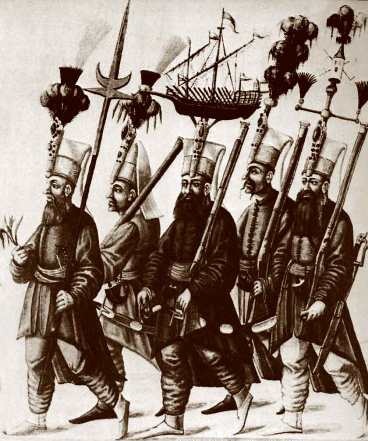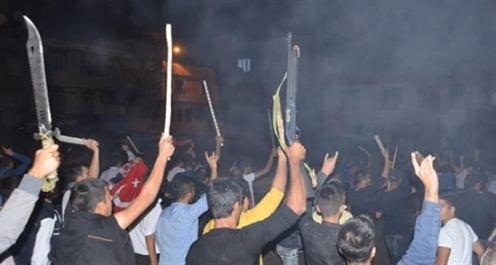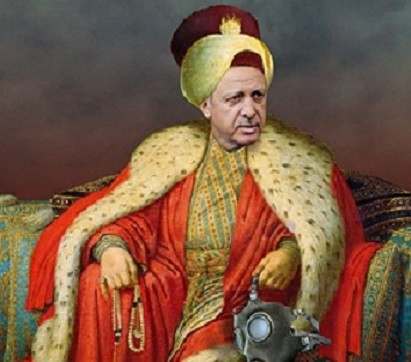According to the German Orientalist Brockelmann, the Ottoman Empire has recorded decisive victories between the years 1324 and 182
Israa Al-Fass
 According to the German Orientalist Brockelmann, the Ottoman Empire has recorded decisive victories between the years 1324 and 182. These victories were able to expand the scope of its authority in the wars waged by the Ottoman army, where the Janissary units played an important role as its fundamental cornerstone and basis. The Battle of Marj Dabiq fought on (1516), north of Aleppo, is considered one of the most important Ottoman battles in history. It ended in the Mamluk Sultanates defeat, allowing the Ottoman rule to take control over the Arab region for more than 500 years.
According to the German Orientalist Brockelmann, the Ottoman Empire has recorded decisive victories between the years 1324 and 182. These victories were able to expand the scope of its authority in the wars waged by the Ottoman army, where the Janissary units played an important role as its fundamental cornerstone and basis. The Battle of Marj Dabiq fought on (1516), north of Aleppo, is considered one of the most important Ottoman battles in history. It ended in the Mamluk Sultanates defeat, allowing the Ottoman rule to take control over the Arab region for more than 500 years.
The Janissaries were the strongest units of the Ottoman army and they have been described as the state’s “awesome tool”. Their name used to cause feelings of fear and dread, and the victories they often achieve was, thanks to the horror they caused, not limited to their fighting in the battles only. Their elements were composed of young people who were raised with “religious-military” education in special camps, where they were detached from their places of origin to practice fighting techniques as their sole task. They were raised with the concept of depreciating life and of fighting desperately. According to the English historian Grant, the fate and future of the Ottoman Empire depended to a large extent on these units, which were the reason for the advance of the ranks of the Ottoman army in every battle.
In fact, it seems that the ISIL organization today is similar to the Janissaries in the Ottoman era. An expert on Turkish affairs Dr. Mohammad Noureddine describes the elements of this organization as the “new Janissaries”. He stresses that Turkey is “the biggest sponsor” to the ISIL organization that is “its only tool at this stage, so as to have impact on the developments in the region, in both Syria and Iraq”. He believes that Turkey is refusing to participate with the international coalition, despite the American pressure, because it sees that this would “put an end to the only tool used by it to impose its influence in the region”.
Turkey: We have no problem with ISIL
In a phone call with Al-Manar TV, the Turkish researcher Zahed Gul, who has close ties with the “Justice and Development Party” (AKP), commented on Turkey’s demand to join the coalition, after the events of the Ayn Al-Arab district. He revealed that the United States “funded Turkey to fight the ISIL in Kobani and in other areas”, adding: “However, the Turkish Deputy Prime Minister said bluntly that Turkey has no mercenary soldiers and that it will not fight on behalf of anyone. Those who have a problem with the ISIL let them fight it by their selves”.
According to Gul, “Turkey will not intervene by its own, but will rather intervene with the involvement of International forces”. He described “the problem of the ISIL” as an interim and unrealistic one, saying that it is “merely a response to the Syrian regime”. The researcher who is a close ally of the ruling party in Turkey believes that his country considers that the presence of the Syrian army on its borders is worse than the presence of the ISIL there.
Turkish officials - most notably Turkish Prime Minister Ahmed Daoud Auglo- say repeatedly that Turkey has no problem with the ISIL. Therefore, Turkey intends deliberately to compromise the implementation of what the Americans demand in terms of joining the coalition, at the time when the battles of Kobani are taking place in front of the eyes of the Turkish military machines that are lining up at the border to look at the smoke rising from that Syrian city.
It may not be true to say that Turkey is distancing itself from the battle of Kobani, for it did not adhere to neutrality as much as it was one part of it. Dr. Mohammad Noureddine mentions in one of his articles: “Turkey paid the price for its complicity in Ayn Al-Arab (Kobani) even before its fall”. According to a report by the “France- Press (AFP)”, international news agencies spoke about a report on the Turkish Kurds who are being prevented from leaving the Turkish territory to fight the ISIL. This comes in line with what the “Sky News” TV channel has expounded regarding “the exit stamps that are sealed on the passports of the ISIL fighters in Kobani upon their departure from the Turkish border towards Syria”.
The repercussions of Kobani battle in Turkey
 Dr. Mohammad Noureddine, in an interview with Al-Manar TV, stresses that “The stone thrown by Turkey in the face of its opponents i.e. Kobani began to turn against it”. He has an article about those repercussions, as well as about the fact that the Turkish cities, especially Gaziantep, have turned into battlefields, where the sound of bullets is being heard and the swords are being raised as well, as signs of support for the ISIL. The same goes for other cities that are sinking in a river of blood after they have witnessed demonstrations calling for supporting the battle of Kobani.
Dr. Mohammad Noureddine, in an interview with Al-Manar TV, stresses that “The stone thrown by Turkey in the face of its opponents i.e. Kobani began to turn against it”. He has an article about those repercussions, as well as about the fact that the Turkish cities, especially Gaziantep, have turned into battlefields, where the sound of bullets is being heard and the swords are being raised as well, as signs of support for the ISIL. The same goes for other cities that are sinking in a river of blood after they have witnessed demonstrations calling for supporting the battle of Kobani.
For his part, Al-Manar correspondent in Turkey, Hassan Tahrawi, clarifies that the majority of those who were killed in the demonstrations that were organized by the Kurds in solidarity with Kobani were not shot dead by the Turkish security forces, but by the bullets of the extremists who were between the demonstrators who came to raise slogans of nationalism. He pointed out that this happened in Diyarbakir and Gaziantep; the two areas where a large number of displaced Syrians are sheltering in addition to the leaders of the ISIL, the Nusra Front, and other armed factions of the Syrian opposition.
Similar to Noureddine, Tahrawi stresses that the crisis has moved to Turkey, despite the government’s attempts to handle the situation, pointing to statements by Kurdish officials in which they said: “The fall of Kobani means the fall of Ankara”.
Kobani, the gateway to the region
Yet, what does Turkey want from the battle of Kobani? What are the results that make Ankara ready to pay taxes that might affect its interior stability?
It is reported that the reading of history is a key to understand the present and to foretell the future. According to a previous report by Al-Manar, Turkish President Recep Tayyip Erdogan has once said: “It is that we are the descendants of the Seljuks and the remnants of the Sublime Ottoman State... “The Justice and Development Party (AKP) is a party in which the spirit of the Seljuks and the Ottomans is deeply rooted”. Hence, would the equation of Marj Dabiq when the Turks took control over the region for 500 years be repeated after the battle they fought in the north of Syria! Are the Turks pondering the Kobani harvest that would be parallel to that gathered by their ancestors in Marj Dabiq?
 Turkey is facing the American pressure to urge it to join the international coalition with equivalent conditions represented in Ankara’s demand to train and arm the Syrian opposition. The conditions include the following:
Turkey is facing the American pressure to urge it to join the international coalition with equivalent conditions represented in Ankara’s demand to train and arm the Syrian opposition. The conditions include the following:
1. Building a buffer zone and imposing a no-fly zone that would guarantee a safe area for the fighters in the ranks of the Syrian opposition and would act as a center of operations in the Syrian territories. It could also be a safe haven for those displaced people in the Turkish territories, whose presence in Turkey is disquieting it.
2. Ensuring that the Kurds should never be provided with weapons and abolishing any independent entity that belongs to them in Syria, so as not to improve the status of the Kurdistan Workers’ Party (PKK) or the other Kurdish parties in Turkey.
3. Making sure that the air strikes of the coalition would include official Syrian targets in order to “topple the Syrian regime”. Turkey believes that its problem is with it and not with the ISIL.
Therefore, Turkey is certain that it is a historic and good opportunity to restore its “conquests” in the region. Perhaps it is confident that the fall of Syria would open the gate of the region in front of a Turkish undisputed influence, and its foundation would be a Syrian regime that is loyal to Turkey, aiming at reflecting this on Jordan, Palestine, Kuwait, Qatar, Tunisia, Libya, and possibly Egypt later on... In other words, the regimes would fall down similar to the falling of the stones of the “Domino” in favor of regimes that share profoundly the same thought with the ruling party in Turkey. If these aspirations came true, they would raise question marks about the shape and composition of the region in the future. Precisely, this would put the fate of the Kingdom of Saudi Arabia, the UAE and Bahrain in its current form on the line, so as to re-draw the map of the Arabian Peninsula ... Yet, is the ISIL going to accomplish achievements for Turkey as those accomplished by the Janissaries in favor of the Ottomans?
For nearly 502 years, the Ottoman Empire’s army depended on the dreadfulness of the Janissary units based upon which it achieved victories ... It expanded the scope of horror and ruined the life of the Sultanate itself. The only job of the Janissaries was not only to fight wars, but they also intervened in the affairs of the Sultanate by isolating rulers and killing others, until they were eliminated in a massacre perpetrated by the Ottoman army in the year 1826. Today, the Turks depend on the viciousness of the ISIL as a tool of influence in the region. Despite the fact that Turkey did not achieve any victory so far, the repercussions of the brutality of the said organization against it began to materialize...
When one of the elements of the ISIL organization was being asked about the issue of cutting off the water flow to Syria and Iraq by the Turkish government, in a series of short documentaries prepared by the “Vice News”, he replied: “I pray to God Almighty that the apostate (Turkish) government reconsiders its decisions, because if they do not reconsider it now, we will reconsider it for them, with the help of God, by liberating Istanbul”. He continued saying: “Yes, this is a clear threat, God willing, and if they did not re-open the Euphrates Dam, we are going to do it from Istanbul”.
Translated by: Mayssa Hazimeh
To read the Arabic version of the report, please click here.